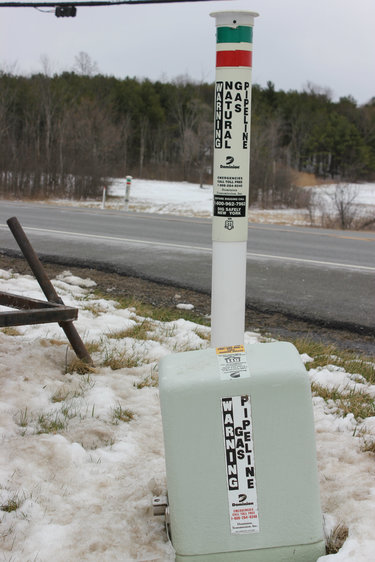Environmental concerns grow over proposed pipeline expansion
ALBANY COUNTY — Resistance to expansions of Kinder Morgan’s Northeast Energy Direct Project (NED) is growing among local residents and local governments.
“There’s potential danger,” Bethlehem Supervisor John Clarkson told The Enterprise. “There’s usurpation of property rights. There’s really no support for it among citizen groups or local governments. We’re pretty much united in opposing this.”
Tennessee Gas Pipeline, owned by parent company Kinder Morgan, is preparing to expand its supply pipes across Albany County to reach downstate and New England. Last year, Tennessee Gas announced new routes for its proposed Northeast Energy Direct project, but a majority of them follow the same pipeline routes that exist in the towns of New Scotland, Berne, and Knox, while expansion of pipe laterals may extend the project through new areas of Berne and Westerlo.
Representatives from the towns of Wright and Knox were contacted for this story, but did not respond before press time.
The expansion has met local resistance as towns and, later, Albany County, passed resolutions calling for public forums and drinking water protection from potential blasting.
Now, local governments are taking stands against the pipeline expansion and studying ways that adjacent land may be adversely affected if the expansion occurs.
Kinder Morgan is moving along in its application process, according to a pipeline representative.
“We are continuing to address issues as they are raised by individuals, towns, communities and other stakeholders via the official docket as part of the FERC certificate application process,” wrote Richard Wheatley, the director of corporate communications and public affairs for Kinder Morgan, in an email to The Enterprise this week. “In sum, we are focusing on the project’s FERC certificate application and the regulatory process.”
Tennessee Gas plans to use the same right-of-way where existing pipes lie, Albany County Legislator L. Michael Mackey told The Enterprise earlier. Mackey championed the drinking water law, adopted first by Albany and then Rensselaer counties, meant to make any company that blasts responsible for ensuring that residents near the work continue to have safe water supplies.
“It will be another pipeline in the same right-of-way,” Mackey said previously. “They are cutting a new trench for this additional pipeline. This is a whole new pipeline.”
The town of Bethlehem has taken the strongest stand in the region, with its adoption in February of a resolution to request that the state perform a comprehensive Health Impact Assessment about potential risks posed by the proposed Northeast Direct pipeline. The resolution also calls for Governor Andrew Cuomo to order the state’s Department of Environmental Conservation to suspend issuing state permits until the impact assessment is complete.
Additionally, the town stated in its resolution that “the pipeline is not needed and urges the Federal Energy Regulatory Commission to not issue a certificate of public convenience and necessity authorizing construction and operation of the proposed Northeast Energy Direct pipeline.”
“We’re encouraged by the broad negative reaction to this proposal that other governments are putting forth,” Clarkson told The Enterprise. “By working with the other governments, we may well have an impact.” Towns in Massachusetts and in New York’s Columbia and Rensselaer counties have also resisted the pipeline expansion.
Clarkson said that towns and citizen groups are using advocacy to “bring better decision-making to bear.” The broad scope the resistance has not been seen with other pipelines or related issues, he said, but “this particular one has no benefit for the region.” The plans put forth by Kinder Morgan call for gases to be transported through the pipelines toward New England, for export.
Clarkson said that Kinder Morgan’s pipeline expansion does not help local residents. Asked if it could harm them, he said, “It could, certainly.
“It’s a disturbance to property, and property rights,” he continued. “The whole point of eminent domain is to benefit the community. In this instance, there is no benefit.” He said that the Bethlehem Town Board will discuss its resolution and legal actions at its meeting next Wednesday, April 13, at 6 p.m.
Resistance
“There are now over 80 communities and counties in New York, New Hampshire, and Massachusetts that have formally opposed this proposal,” said Robert Connors of the group Stop NY Fracked Gas Pipeline, which has hosted anti-pipeline meetings in several counties, in an email to The Enterprise. “No others have approved this pipeline.”
Connors told The Enterprise that each pipeline, filled with “toxic gases,” leaks a small percentage, and each is designed to be vented to increase or decrease pressure for maintenance purposes or for unplanned emergencies.
Areas where gases are released are “dangerous places for organic life,” Connors said.
The compressor station planned for the town of Wright, from which the lines will flow through the Hilltowns to New Scotland and Bethlehem, is designed to release gases regularly, and to operate at 41,000 horse-power, Connors said.
“It’s the biggest compressor station for Kinder Morgan east of the Mississippi River,” he said. “They’re really the bad boy, these compressor stations.”
Three weeks ago, Connors and his group held a public meeting in Knox.
“We filled up Town Hall,” he said. “The sad thing is, the proposal is approaching two years old, and people don’t even know about it.”
In New Scotland, Supervisor Douglas LaGrange said that he has attended meetings in Bethlehem about the pipeline, and he plans to attend an upcoming meeting in Clarksville, with a date still to be scheduled.
If New Scotland’s town board attends, he said, “it would give our board a potential grasp of the issues,” he said, and the town could then decide if it wants to join others in protesting the pipeline expansion.
Attending the meetings affected LaGrange’s perspective on the proposed expansion, he said about the Bethlehem presentation he attended with Mackey.
“It certainly jarred us a bit on what could happen,” he said.
He said that the town needs to know if the pressure of gases in the pipelines will remain the same, or double, as pipeline protesters suggest.
“These are things we need to have answered,” he said.
LaGrange, whose water was directly affected by pipeline blasting decades ago, said that he had not met with pipeline representatives recently, but that he had discussed his past experiences with them previously.
“Facts are hard to get around [even when] you don’t want to hear them,” LaGrange said.
“We haven’t taken a position vis-a-vis the...Northeast Direct pipeline, in particular,” New Scotland Councilwoman Patricia Snyder told The Enterprise.
“As a town board, the town board took a firm position with respect to what we know, as a municipality, we can control about the effects the pipeline can have on drinking water,” she said.
“We all stood behind Mike Mackey and implemented the drinking water protection law that that’s something that certainly impacts the town as a result of all these pipeline plans out there, none of which are approved yet. That’s what we can concretely do, is protect our drinking water, and that’s what we have done,” Snyder said.
“We will be listening to any presentations that any of these advocacy groups want to bring forward to us. As a formal policy, we haven’t passed any resolutions yet,” she said.
Connors, of Stop NY Fracked Gas Pipeline, said that FERC rarely denies an application, but that 20 percent of applications for FERC certificates are withdrawn.
“That’s our hope — we can create so much opposition that Kinder Morgan just gives up,” Connors said. “Market forces are working against them right now, the price of gas and oil is so low.”
Small-town,
upstream concerns
Berne’s conservation board did its own study of the possible effects of the pipeline expansion, according to Kathleen Moore, the chairwoman.
According to the report, the conservation board’s goal was “to protect, and require, the restoration of wetlands and related ecosystems.”
The report called on Tennessee Gas, and Kinder Morgan, to mitigate and restore the watershed, if it becomes disturbed; to provide a water and wastewater disposal plan; to monitor the Fox Creek watershed and its habitat; to monitor the water quality of the Fox Creek and Warner’s Lake; and to monitor and take care of water retention in wetlands, and erosion.
“Given that we observed that erosion mitigation standards were already violated in the last few months, following a repair in the existing pipeline, it is imperative to have independent monitoring,” the report says.
“Our members walked most of the length of the existing pipeline, and where it will be...laid in the same right of way,” Moore told The Enterprise. “We had some fairly significant concerns...The existing pipeline right of way passes through a number of wetlands.”
The pipeline was constructed in the 1950s, she said, and DEC designations for wetlands have changed significantly since then. The wetlands there now are “large,” Moore said. “The construction of new, even in the existing, will disrupt those wetlands...in the Fox Creek watershed.”
The wetlands in Berne extend into Knox, as does the pipeline, Moore said. Berne has met with the Conservation Advisory Council in Knox “to see what things we can do together,” she said. “Environmental things don’t respect town boundaries.
“It’s important for towns to recognize — it’s not just one town,” she said.
“We should work together.”



